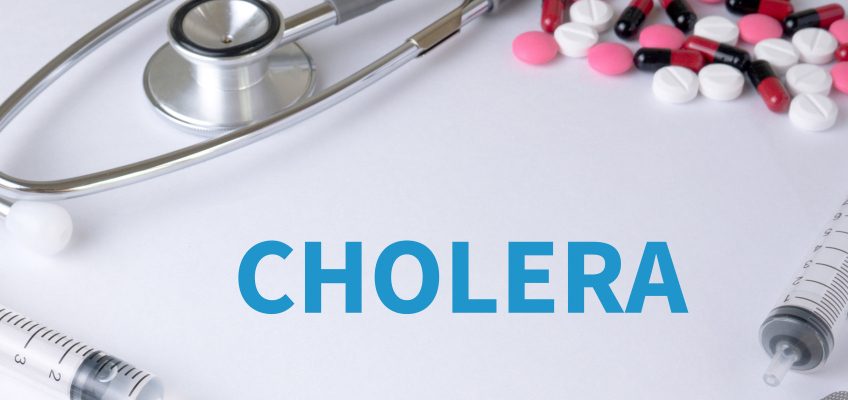Cholera is an acute diarrhoeal illness caused by the bacterium Vibrio cholerae. Left untreated, it can cause death within a matter of hours.
Cholera, which causes severe diarrhoea and dehydration, is most often seen in people who have travelled to developing countries.
Globally, researchers believe that there are between 1.3 and 4 million cases each year. It is also estimated that Cholera is responsible for between 21,000 and 143,000 deaths worldwide every year.
Although the Cholera organism has been detected in some rivers along the east coast of Australia, infection in Australia is very rare. Almost every Australian case is contracted whilst the person is overseas, usually having visited countries where the disease is still common.
How do you get it?
The bacteria responsible for Cholera live in the faeces of infected persons.
Cholera is mostly transmitted through the consumption of food or water which is contaminated by infected faeces. For travellers, this usually means drinking contaminated water, eating food which has been washed with contaminated water or prepared with soiled hands. It can also be contracted by eating fish or shellfish that was caught in contaminated water.
Person-to-person contamination is rare but it can happen, particularly when there is contact with microscopic amounts of an infected person’s faeces or vomit. This usually occurs through direct personal contact or indirect contact (eg by touching contaminated surfaces such as taps, toilet flush buttons, nappies, toys and linen).
Where in the world is it?
Whilst infection can occur in any country, Cholera is most prevalent in developing countries where hygiene standards and sanitation are poor. Travellers to some parts of Africa, Asia, South America, the Middle East and Pacific Islands are at risk.
What are the symptoms?
Many people will not develop any symptoms or at worst only experience mild to moderate illness. A small number of people will develop severe symptoms and in this case it is extremely important that urgent medical treatment is sought.
Symptoms usually manifest within 2 hours to 5 days. Most people experience symptoms 2-3 days after the bacteria has been ingested.
The most obvious symptom is the sudden onset of painless and profuse watery diarrhoea (sometimes referred to as “rice water” faeces). Other symptoms include nausea, vomiting, dehydration, weakness, lethargy and muscle cramps.
How is it diagnosed and what is the treatment?
Diagnosis can only be confirmed by testing a stool sample. If you think you have been infected, it is important you consult a doctor. If left untreated, symptoms can worsen and lead to death, particularly in the case of small children, older and/or infirm persons.
Although it can prove fatal, Cholera is easily treated with immediate rehydration – that is, replacement of fluids and salts lost through diarrhoea. This typically involves oral rehydration fluids which can be purchased over the counter at most pharmacies. However, if the patient is severely dehydrated and/or not able to tolerate oral rehydration, they may require hospitalisation and IV fluid replacement. Authorities state that with prompt rehydration, less than 1% of Cholera patients die.
Antibiotics may be prescribed and whilst they shorten the duration of illness, it is rehydration which is key to recovery.
How can you minimise the risk of contracting Cholera?
Pre-travel Cholera vaccinations are available to minimise the potential of infection. The vaccine only provides partial protection (approximately 50%) and remains effective for up to 6 months (maybe longer in adults).
However, the risk of infection for travellers in afflicted areas is thought to be less than 1 in 500,000 if appropriate food and water guidelines are followed.
Vaccination is generally only recommended for high-risk travellers – eg people who are at increased risk of diarrhoeal disease or suffer conditions which result in impaired immunity. It is also recommended for certain travellers such as aid and refugee camp workers who will be in rural or remote locations for a long period of time and in close contact with locals. Vaccination is not routinely recommended for all travellers and prevailing medical advice is to take care whilst travelling to practise high quality sanitation and safe food preparation.
Here are our top tips to help minimise the potential of infection if travelling to high risk areas:
Eating and drinking
- Consume pasteurised milk and dairy products.
- Avoid food prepared by street vendors.
- Avoid raw or soft-cooked eggs. If eating eggs, eat hard boiled eggs only.
- Avoid raw or undercooked fish and meat.
- Avoid salads, fresh fruit juices and raw dairy products.
- Consume bottled (and sealed) water. If not possible, make sure the water has been boiled, filtered and treated.
- Use bottled water while cleaning teeth / dentures.
- Avoid drinking local water (including cordial, ice cubes and ice blocks).
- Avoid public drinking facilities (eg bubblers and water fountains).
Hygiene
- Wash your hands and wash them often – particularly after visiting the toilet and/or before eating or drinking.
- Carry (and use) hand sanitizer.
- Avoid contact with people who are sick.
- Avoid touching your face and mouth. If you need to, ensure your hands are clean.
- Don’t share utensils, cups or plates.
- Do not share personal care items.
- Avoid close contact with others (eg kissing and hugging).
Many travellers are exposed to Cholera. Fortunately there are measures you can take to minimise the risk of infection. Please speak to your doctor to find out how best to protect yourself while travelling.
Got questions? Why not call us on 1300 819 888 or send us an email info@goinsurance.com.au


